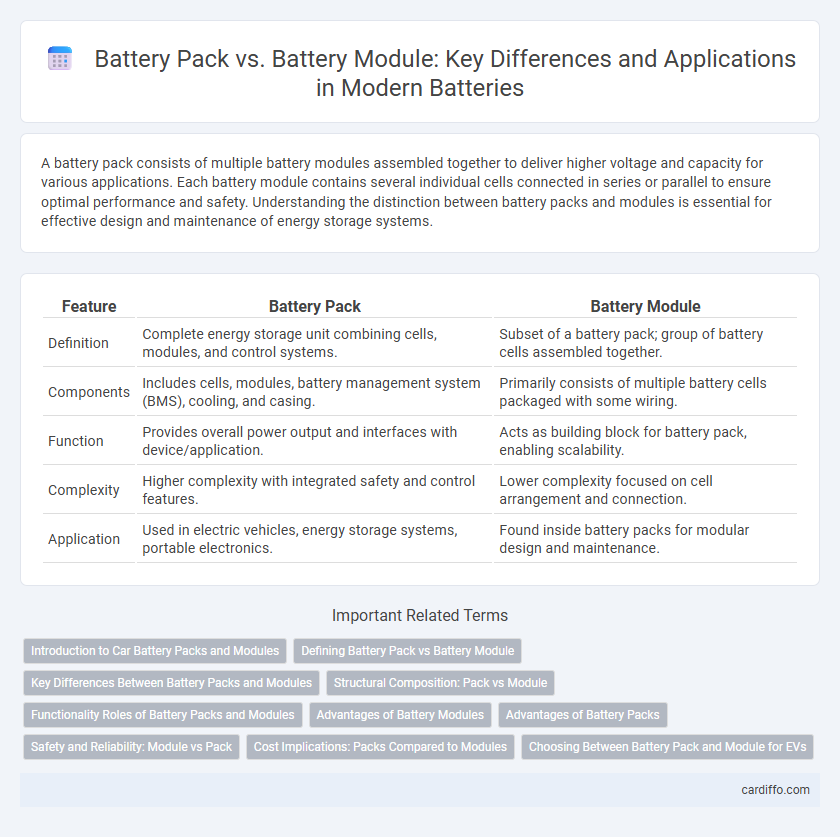A battery pack consists of multiple battery modules assembled together to deliver higher voltage and capacity for various applications. Each battery module contains several individual cells connected in series or parallel to ensure optimal performance and safety. Understanding the distinction between battery packs and modules is essential for effective design and maintenance of energy storage systems.
Table of Comparison
| Feature | Battery Pack | Battery Module |
|---|---|---|
| Definition | Complete energy storage unit combining cells, modules, and control systems. | Subset of a battery pack; group of battery cells assembled together. |
| Components | Includes cells, modules, battery management system (BMS), cooling, and casing. | Primarily consists of multiple battery cells packaged with some wiring. |
| Function | Provides overall power output and interfaces with device/application. | Acts as building block for battery pack, enabling scalability. |
| Complexity | Higher complexity with integrated safety and control features. | Lower complexity focused on cell arrangement and connection. |
| Application | Used in electric vehicles, energy storage systems, portable electronics. | Found inside battery packs for modular design and maintenance. |
Introduction to Car Battery Packs and Modules
Car battery packs consist of multiple battery modules combined to deliver higher voltage and capacity essential for electric vehicle performance. Each battery module contains several individual cells connected in series or parallel to optimize energy storage and management. Understanding the distinction between battery packs and modules helps improve maintenance, thermal management, and overall battery lifespan in automotive applications.
Defining Battery Pack vs Battery Module
A battery module consists of multiple connected cells structured to function as a single unit, offering easier management and thermal control. A battery pack incorporates several modules combined with a battery management system (BMS), wiring, and protective housing to provide a complete power source for devices or vehicles. The distinction lies in the module being a component within the pack, while the pack delivers the final electrical output for end use.
Key Differences Between Battery Packs and Modules
Battery packs consist of multiple battery modules integrated into a single unit, providing a higher energy capacity and enabling complex power management systems. Battery modules are smaller subunits containing a series of cells, designed for easier replacement and enhanced thermal management within the pack. Key differences include modularity, scalability, energy density, and thermal control, with packs optimized for overall system integration and modules focused on cell grouping and safety.
Structural Composition: Pack vs Module
A battery module consists of multiple individual cells arranged and connected within a single casing, optimizing thermal management and electrical performance at a smaller scale. In contrast, a battery pack integrates several modules along with a battery management system (BMS), cooling systems, and protective housing, creating a complete power source unit. The structural composition of the pack emphasizes modular scalability and system-level safety, while the module focuses on cell grouping and internal connectivity.
Functionality Roles of Battery Packs and Modules
Battery packs integrate multiple battery modules to provide a unified power source with higher voltage and capacity, optimized for delivering energy to devices and systems. Battery modules consist of several interconnected cells designed to balance charge, monitor health, and ensure safety, serving as the fundamental building units within packs. The primary functionality of battery packs is energy delivery and power management, while modules focus on cell organization, thermal regulation, and performance consistency.
Advantages of Battery Modules
Battery modules offer enhanced flexibility in design and maintenance compared to battery packs, allowing for easier scalability and replacement of individual cells. They provide improved thermal management and safety features by isolating cells within a smaller unit, reducing the risk of failure cascading through the entire system. Additionally, battery modules facilitate better performance monitoring and diagnostics, enabling targeted interventions that extend overall battery life and reliability.
Advantages of Battery Packs
Battery packs offer higher energy density by integrating multiple battery modules, optimizing space and weight efficiency for electric vehicles and portable devices. Their design enables enhanced thermal management and uniform power distribution, improving overall safety and performance. Furthermore, battery packs facilitate easier maintenance and scalability by allowing individual module replacement without dismantling the entire system.
Safety and Reliability: Module vs Pack
Battery modules offer enhanced safety and reliability by incorporating individual cell monitoring and balancing systems that prevent thermal runaway more effectively than battery packs. These modules facilitate easier fault isolation and replacement, reducing the risk of cascading failures across the entire battery pack. Consequently, battery packs built from well-designed modules demonstrate improved thermal management and prolonged operational lifespan.
Cost Implications: Packs Compared to Modules
Battery packs typically incur higher upfront costs than battery modules due to integrated management systems, robust casing, and additional safety features. Battery modules offer cost savings by allowing scalable assembly and easier maintenance, reducing long-term expenses in large-scale applications. Manufacturing complexity and customization levels significantly influence the cost disparity between battery packs and modules.
Choosing Between Battery Pack and Module for EVs
When selecting between a battery pack and a battery module for electric vehicles (EVs), consider energy density and maintenance requirements; battery packs integrate multiple modules into a single system, offering higher capacity and simplified thermal management, while battery modules provide modularity and easier replacement of faulty units. Battery packs are better suited for EVs demanding long ranges and consistent performance, whereas battery modules allow customization and cost-effective repairs in smaller or less complex vehicles. Evaluating factors like vehicle design, weight constraints, and scalability helps optimize battery system efficiency and lifecycle costs.
Battery Pack vs Battery Module Infographic

 cardiffo.com
cardiffo.com